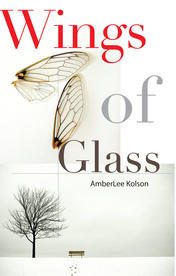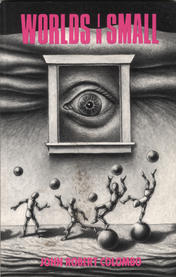Fiction



The folding wooden chair was getting harder by the minute. One of the cross-slats got her in the small of the back, the sharp edge digging into her, pressing either on the hard nub of vertebra, or, worse, into the softer flesh between the bones of her spine. What had been merely uncomfortable three hours ago was past painful and well on the way to agonizing. The edge of the seat pressed against the backs of her legs, slowing the flow of blood, numbing her toes and feet. Her ankles swollen and numb, she wiggled her toes frantically, but all that got her was a sharp pinch above the elbow. There would be a blue bruise there within minutes. No wonder so many of the Family had varicose veins, phlebitis, fluid retention and dropsy! No wonder so many suffered paralyzing strokes! If God had intended them to sit all day Sunday on Spartan chairs, their legs would disconnect on Saturday night.
Doug O'Leary was well into his lesson. He'd been talking for almost an hour, carefully tracing some obscure trail that had started with the quotation, "A thousand years are but a day in the sight of God." Doug seemed to think at this point that he'd effectively disproved carbon-dating techniques and the theory of evolution and was zeroing in on something else. Probably yet another prediction of the day the world would end.
It was supposed to have ended March 21, 1843, according to William Miller. And when March 22 rolled around, the founder of both the Jehovah's Witnesses and the Seventh Day Adventists decided he'd been out half a year in his calculations and rescheduled the event for October 21. So, as the dawn broke, the Millerites went to the rooftops, ever nearer my God to Thee, with celebratory picnic lunches, just in case the great event was closer to twilight. They ate their lunches. Those who had leftovers ate them for supper, and on the 22nd they came down from the roofs, their faith still intact, and waited for the next prediction.
Doug had at least made it to the First World War. The world was supposed to have ended in 1914 too, but obviously hadn't. Doug seemed convinced that what had really been predicted was that those born in, or at least near, 1914 would live to see the end of the world. Unless, one could only suppose, a runaway bus intervened. Or disease. Or, oh-oh, wait a minute here, back up, each and every person born in or before 1914 is going to have to die before the last days arrive. Including those old Russians who live on yogurt and grain and show up in the pages of National Geographic looking translucent and calm, claiming to be one-hundred-and-six or two-hundred-and-four or whatever. Actually, she suspected, they were only sixty-three, but living in that place on that diet, it all seemed so much longer, so endless and unremitting.
And now he's reminding us about four score and ten. Ninety years. So 1914 plus ninety is ... what? 2004. Well, that'll give us a bit of time. We can all carefully choose our picnic baskets, start planning the menu, practicing our recipes, so that when we go up the aluminum ladder to the roof, we go up with something more in keeping with the occasion than mere peanut-butter sandwiches in a brown paper bag.
Look at Beth McRae staring up at him as if the sun rose and set only because he told it to. So much for upright whatever. He's married, got four kids, and his wife is as alive as anyone else. Bloody hypocrites. The most upright thing about Doug O'Leary seldom sees the sunlight. Two-faced ungodly righteous! Nobody looks at anybody else that way unless there's been encouragement. These are the same ones quote the Sermon on the Mount and say if you sin in your heart, you're guilty, even if you don't do anything about it.
She wiggled her toes again, got pinched again, but the Hand of God intervened and Doug O'Leary finished his lesson. People did not clap, but they did nod firmly, approvingly, before rising and moving to the hallway. Ten minutes to get the blood moving, pee and get back to Your seat before the next session.
She waited politely. Pregnant sisters first, then elderly sisters, then those sisters trailing children. And finally it was her turn, and none too soon; she felt as if she were going to flood. And, by God, there it was again! Something ... different ... about that knot in the wall. just as she'd thought last Sunday. Well, at least this week she was ready. Last week she hadn't been sure. Well, not true exactly, she had been sure, but what do you do? Yell, and have everybody look at you as if you were the pervert?
She bent forward, opened her purse, took out what looked for all the world like a tampon, then, just as she'd rehearsed a dozen times in her head, she pulled down her underpants and stepped out of one leg hole, letting the cotton wisp dangle. She put one foot on the toilet seat, leaned forward as if to insert a tampon and, instead, jammed the counterfeit tube through the knothole and squeezed. Then she hit the end with her other palm as hard as she could.
The squeeze bulged the hidden balloon, the slam sent a ballpoint pen through the end of the distended, fluid-filled party favour and a mixture of India ink and household bleach squirted out through the hole.
Calmly, then, she took the real tampon from her purse, pulled out the sodden one, inserted the fresh, dropped the used one in the toilet then stepped back into her cotton underpants. She pulled her sniper's revenge from the knothole, dropped it in the toilet and flushed. Then left the Sisters. Not the Women's or the Ladies', heaven forbid, everyone here was a Sister or a Brother. Except for the Servants and Elders, of course. They stood in loco parentis. Loco for sure, parentis probably not.
She walked quickly back to the hard wooden chair and sat down, A hiding her intense satisfaction. She had no idea what would happen next. Her stomach tingled and knotted pleasantly, her face and hands felt warm in spite of the chronic chill in the room. "You'll enjoy this next part," her mother promised with a satisfied smile, whose meaning was made amply clear once the congregation was resettled.
Anton Vaymer moved to the podium, his sheaf of notes at least an inch thick. Beside her, bladder still miraculously undrained, her mother sighed contentedly.
Daleth sighed, then wished she hadn't. Her mother was sure to misinterpret the sigh. Her mother misinterpreted everything, her capacity for revision practically astounding. He'll talk about how a widow had to marry her husband's brother to protect the purity of the tribe and ensure no quarrel over inheritance. Then he'll talk about what a great idea it is and how men should marry a sister-in-faith. An throw in some St. Paul, "better to marry than to burn," and probably the part about a good woman being more dear than pearls. And he'll look at me. In between every paragraph, he'll look at me. And she'll look approving and proud and suitably aware of her improved position. And soon they'll all be looking at me. She wished the floor would open, the roof fall or the Last Day arrive.
Anton Vaymer was a Servant, forty-five years old at least. His first wife took the kids and left him. Anton found her, reclaimed his sons and his daughter and reported her to the Elders. Her name was read out and she was Shunned. Anton divorced her and kept the children, and when she tried to fight him for custody the Elders of the congregation appeared as character witnesses for Anton. Anton remarried, to a seventeen-year-old sister-in-faith who immediately became mother to a ten-year-old, an eight-year-old and a four-year-old. A year later she had an infant to care for too. Three months ago she had died of post-partum haemorrhage, giving birth to her second child. Twenty-one years old, worked to death and fucked to death and not even cold in her grave, but Anton is on the prowl again. And even the poor dead woman's family approves of the prowl because she has been guaranteed her place among the Saved. When the world ends she will be raised to life again, one of the Chosen, and there is no marriage for the Chosen, they will spend Eternity in the service and worship of God, completely unconcerned with the things of this earth and the flesh. Besides, her two little ones needed a mother.
Daleth didn't want to marry Anton Vaymer. She didn't want to be mother number three to five kids aged from infant to fourteen. She didn't want to graduate from high school to a life of cooking, laundry, housework, child-care, pregnancy and more of the same.
High point of the day: the Head of the House comes home from work, has a bath, changes his clothes, is given a cup of tea and gets a report on everyone's behaviour so far. While he's having his tea and punishing the errant, the wife cleans the bathroom, hangs up his clothes, sets the table and serves supper to those not banished to their room -- after supper, home study. Then bath and bedtime for the children. Then dishes and clean up the kitchen. Then bath and bed and a bit of the old bounce on the bones. Tuesday night, the same, except dishes have to be done right after supper so everyone can run around like fools and get ready to go to Group Study. Two hours of that and home for the bedtime rush and, of course, more bone bouncing if the Head of the House wants. Wednesday night, the same as Monday night; Thursday night, the same as Tuesday night; Friday night, Hall Study for three hours. Saturday, all day it's "go ye unto the highways and byways and tell the good news in my name." Sunday, back to the hall for hours of folding chairs and listening ears.
Anton Vaymer finished, the faithful nodded, some of them sliding their eyes to where Daleth was sitting, hands folded on her lap, eyes downcast, face pale. The faithful were reaching for their books and their coats, getting ready to leave, and then Einair Swensen was up front, face nearly purple.
"Brothers and Sisters," he said loudly, "Servants and Elders. A moment please." His accent thickened. "We are much accused of being clannish, of ignoring other people, and of being unfriendly. Small wonder." He jabbed the forefinger of one hand into the palm of the other. "God said we should avoid the unrighteous, and so we do. And this often means we are martyrs in His name. " He shook his head, his jowls quivering. "Young Brother Bill McMillan went outside at mid-break, to get some fresh air and contemplate what he'd just heard And was set upon in the parking lot of this, our very own building. Set upon by thugs! By Philistines who willingly do not know our Father And right now, as I speak to you, young Brother Bill McMillan is in the hospital, seriously injured."
She almost laughed. But she had more sense than that, and besides, old Einair Swensen was glaring right at her! "This was the foul act of a devil worshipper!" he thundered. Still glaring at her.
My God, she realized, he knows Bill McMillan wasn't set upon by Philistines. He knows what happened. And he knows he's telling a lie!







